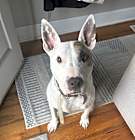Bull Terriers come in two sizes: Standard and Miniature. Standard Bull Terriers typically weigh about 50 to 82 pounds and are about 18 to 22 inches tall at the shoulder. Miniature Bull Terriers usually weigh between 18 to 28 pounds and are about 10 to 14 inches tall at the shoulder.
Both sizes share the same distinctive physical characteristics, such as the egg-shaped head and muscular build, but the Miniature Bull Terrier is bred to be a smaller version of the Standard Bull Terrier.








